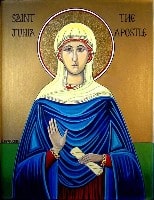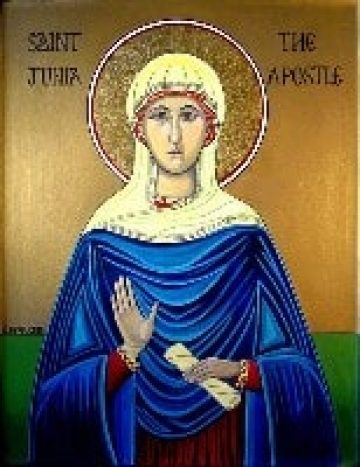
I’m taking a class on feminist theologies of North America. It’s fascinating to see how women of other religious traditions have dealt with patriarchy and gender issues, and if any of their insights can/have been adopted into a Mormon feminist context.
Elisabeth Schussler Fiorenza, a Christian feminist theologian, constructed a framework for feminist hermeneutics (scripture interpretation) which contains four points.
1) a hermeneutics of suspicion — read every scripture as the androcentric text that it is. Realize they were written in a context of male domination, and that the language in scripture conceals the presence of women in the community. Unpack the androcentric language and how the text is either validating oppression or opening itself to a liberating tradition.
2) a hermeneutics of proclamation — while oppression and androcentricism is in scripture, also uncover the liberating insights that have opened up the community to transformative truth. Teach and preach from the liberating texts.
3) a hermeneutics of remembrance — look at the whole of scripture in terms of reconstructing women’s history. Texts show the oppression of women, but they also show women’s resistance and agency. Uncover it.
4) a hermeneutics of celebration (aka creative actualization) — Creatively spin out the stories of women barely mentioned in the Bible, like Junia’s story, who is mentioned by Paul as an apostle. Write novels, poems, plays, midrashes, songs etc. that develop women’s stories and lead us to a better future.
I love this framework, and my imagination was particularly caught by the last point. We Mormons need to creatively spin out women’s stories. We need to use our poetry, our imagination, our vision to bring out women from the shadows of our sacred texts. We need to write poems and plays and songs that tell women’s stories. Fiorenza’s last point focuses on Biblical women, but I see it as absolutely vital that we spin out our own stories as well.
Thus when I saw LDS WAVE’s latest Call to Action, I was overcome with the feeling that this is exactly the type of creative activity we need to lift up among our community. Jena is asking for us to create lyrics for a new song she wrote that is intended to become an anthem for Mormon feminists. It’s a great melody, and she already has a couple of wonderful verses. But we need more. All you creative types out there, please check this out and submit your verses. (I imagine the deadline is flexible.) Doing so is one step we can take to raise up women’s voices and create an alternative vision for our tradition’s future.
- What do you think of Fiorenza’s framework in general? Any points strike you as particularly important or problematic?
- How do you engage in the hermeneutics of celebration? Do you write poetry, personal essays, paint, etc? Please share links to people/projects that you see engaging in this practice.




12 Responses
This may not fit the parameters of the question, but.
I named my daughter Lydia in honor of the Seller of Purple (New Testament, a follower of Paul). A Baptist woman remarked upon her name one day in the store and said, “Do you know who Lydia was?” Oh yes. The craftswoman who made a fortune for herself without any apparent male around to help. Oh, yes. I know who Lydia was.
I love this! What about Martha, sister of Mary and Lazarus? The house in Bethany was her house, not her brother’s. Widow? Why was she allowed to be independent? What about Mary? They were/are the most wonderful women in the New Testament. Liberated women!
😀 Thanks so much, Caroline. With your point about the hermeneutics of celebration, you named exactly what I feel my poetic project is. Restoring the lost voices of women from scripture and from world history in general. I hope many more women will take this project on. I believe the creative Renaissance LDS leaders have spoken of for a while will be a Renaissance of women’s creativity.
I love her framework. I personally lean towards numbers 1 and especially 2, myself, but I enjoy the work others do in numbers 3 and 4, too. It’s just that #2 is what really speaks to me. Speaking truth to power and using the very foundational texts that power is premised upon in order to do so. It’s awfully difficult for people to maintain integrity and disagree when you can build an argument on the very texts they turn to for authentication of their own ideas.
Yes, I will extend the deadline to 11:59 PM PDT on Monday, October 31st. THANK YOU so much for putting my little project out there! I don’t want it to be little anymore. I want it to be something any woman who calls themself a Mormon Feminist (or just about any God/dess-loving feminist!) can relate to, regardless of age, socioeconomic standing, marital status, or even gender. Strength, solidarity, and rejoicing!
For Fiorenza’s framework, I’m personally working on 1 and 3 right now, trying to break down the walls in my head that keep me from seeing the Feminine in holy writ, and learning to put it back in or understand what is already present. It’s proving to be a bit of a challenge, but that’s part of the journey, isn’t it!
Thank you again!
I love this, thank you for teaching me something new about how to look at scripture Caroline! And thank you for bringing my attention to this project. What a wonderful thing! I love writing lyrical poetry, so maybe this is something I’ll try my hand at. And your post reminded me of something about Ruth and Naomi that I’ve been wanting to express in poetry as well. I love looking at scripture this way, as creative muse for our growing understanding and expanding spirituality. Great post!
I love this framework! My study of/interest in women in the scriptures is tied to number #3 – the ones resisting or somehow different are often the ones that get remembered, no? And they make me feel much less alone.
As a side note, I wish we taught the youth (YM and YW) to read the scriptures like this….I only started reading this way as a result of graduate and post-graduate training in literature (which, oddly enough, I never expected to change my Gospel perspective all that much….silly me!). Some of you smarter ladies seem to have done it on your own, but without the guidance/training I would have stayed in my teenaged version of “The scriptures are so dry and empty and mean to women” perception of things.
I’m not sure where I fall.
When I was in college, I was always taught that only women who had money, and social status had an actual name, which would explain why even though there were many women present they weren’t really accounted for.
I love 3. Real heroes are often the quiet ones who do the “cloak and dagger” work for years before liberation or enlightenment are obtained. Discovering these women, who were still faithful even in the face of oppression and erasure, is empowering to me.
Moriah,
I love that! I definitely consider naming our daughters after powerful biblical women an act of retrieval, especially women who are nearly buried in the text.
Maryly,
Yes! I would love to know more about Martha too. I think a great short story or novel or poem could be written about her.
Liz, tell me more about your poetic project. It sounds terrific — I love thinking about LDS women spinning out these stories.
Amelia,
I love 2, also. When I taught GD a few weeks ago, I really played up and focused on that verse in Galatians, “There is neither Jew nor Greek, male nor female, slave nor free, for all are one in Christ Jesus.” Awesome. I think that gives a whole new vision of what the Christian community should ideally be.
Jena, thank you for your great project! I’m glad you’re extending the deadline. I’m fantasizing about writing some potential verses myself — let’s see if I can get my act together and do it.
Corktree,
Please do submit some verses! A verse or two on Ruth and Naomi would be wonderful.
Emmaline, I’m so glad this speaks to you. I would have stayed in the ‘scriptures are so empty for women’ mindframe if I hadn’t taken some grad classes as well. I love having my eyes opened to the ways women of other traditions are finding liberation in these texts, even as they recognize the huge problems of androcentricism.
Diane, yes, the lack of named women is definitely a product of an androcentric and classicst environment. Though the bible has hundreds of women’s names buried within it. What blows my mind is that the Book of Mormon has what? Less than 10?
Spunky, your reference to ‘cloak and dagger’ work of women reminds me of a phrase my feminists friends and I came up with, “Stealth feminists.” The ones who work within the system, but also bring about change and new ideas. The church certainly needs them.
Thanks for all your comments, everyone!
[…] Caroline, “Raising up a Hermeneutics of Celebration Among Mormon Women,”at Exponent II. Caroline mentions Elizabeth Schussler Fiorenza’s four points of a feminist hermeneutics–a hermeneutics of suspicion, a hermeneutics of proclamation, a hermeneutics of remembrance, and a hermeneutics of celebration. I love these creative possibilities for reading biblical texts. […]
[…] that speaks to you and the lesson you’re working on teaching, write your own interpretation: Caroline wrote an excellent post on hermeneutics (finding meaning in scripture), and Bob Rees wrote about midrash (telling a story from scripture […]